
11-Along the River Doron in the Belleville Valley
Woodland trail : 23 km
1 difficult stretch if extension to Lac du Lou
The more adventurous among you could tackle the climb up to Le Lou lake at an altitude of 2,005m, and get a bite to eat at the refuge (3.5km and elevation gain of 280m).
Description
Follow the blue waymarks: Les Belleville.
E-bike rental shop:
Skiset Léo Lacroix la Croisette
Résidence Lac du Lou
73440 Les Ménuires
Secteur : La Croisette
+33 (0)4 79 00 28 15
- Departure : Le Cochet car park, 73440 Saint-Martin-de-Belleville
- Arrival : Le Cochet car park, 73440 Saint-Martin-de-Belleville
- Towns crossed : LES BELLEVILLE
Forecast
Altimetric profile
Recommandations
If in doubt, you can take an introductory lesson in how to ride an electric bike with an instructor.
If you see a herd ahead, slow down and go round it. If there is a patou, a guard dog, climb down from your bike and walk, pushing it alongside you. Avoid making any sudden or aggressive gestures towards the dog and move away from the herd slowly and calmly. The dog will only be checking that you do not pose a threat to its herd. Respect the parkland and close gates behind you after you've gone through them.
The mountain is living, please respect it by staying on the paths and tracks.
Information desks
Place de l'Eglise, 73440 Saint-Martin-de-Belleville
1269, Avenue de la Croisette, 73440 Les Menuires
Transport
Have you also thought about car-sharing?
Access and parking
Parking :
Accessibility
- Emergency number :
- 114
10 points of interest

Barrage de Saint Marcel vu depuis la rive droite du Doron de Belleville. (PNV PO) - Frantz Storck  Water
WaterSaint Marcel Dam
The St Marcel dam on the Doron de Belleville was built in 2008. It constitutes a water intake for the network of artificial snow of Ménuires. A fishway was integrated into the structure to allow fish circulation particularly brown trout and rainbow trout in the Doron.
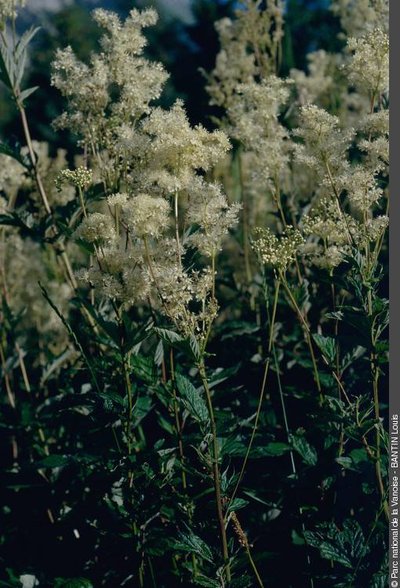
Reine-des-prés. (PNV) - BANTIN Louis  Flora
FloraThe roles and functions of the wetlands
Marshes, swamps, bogs...names that remind us of enigmatic and often unrecognised places. Their typical vegetation is formed of plants adapted to the cold and humid climate of our mountains. These wetlands are beneficial as they regulate the flow of water, trap sediment and filter pollutants. The water discharged is therefore of better quality. The willows (Salix) or the Meadowsweet (Filipendula ulmaria), two species inhabiting these wetlands, have interesting medicinal properties. Man extracts their active substances which are used as components in aspirin.
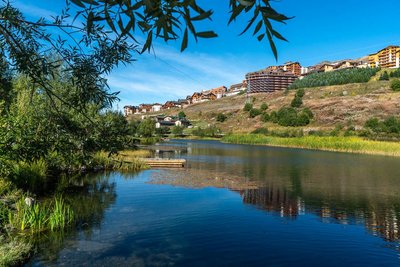
Plan de l'Eau des Bruyères - CCCT  Fauna
FaunaLes Bruyères lake
La Bruyère and the wetlands around the lake are exceptional nature spots home to species of all kinds, including newts, common frogs and brown trout.
15 protected species at national level and 5 natural environments with European Union recognition can be found there. Since 2003 this nature spot has enjoyed Département-level protection through a biotope protection order. There is a very easy interpretation trail running around the lake, complete with educational information, to enable you to explore this remarkable ecosystem.
Intriguing heritage feature: as you head up towards Le Lou lake, you'll see the Cross of the Blessed Paul; a Spanish pilgrim who tried to cross the Alps and whose tomb can be found at Saint-Martin-de-Belleville Church.
 Fauna
FaunaMaison de l'Abeille Noire
Housed in a former mountain pasture chalet, the Maison de l'Abeille Noire was inaugurated in December 2019. Through interactive tools and short films, come and learn about the history of the European dark bee and its daily life in its natural environment. From its journey in the Alps to the production of honey, follow Apis Mellifera Mellifera as it is known in Latin through its own adventures and those of our local beekeepers. This centre is associated with the European dark bee conservatory in the Encombres Valley, just a few miles away.
 Viewpoint
ViewpointView over Val Thorens
A wonderful view can be enjoyed from here over the resort of Val Thorens with, in the distance, the Aiguilles de Péclet (3,561m) and Polset (3,531m) peaks.
The herculean task of building Val Thorens - the highest resort in Europe - began in 1971. Technical or commercial innovations, bold choices and human challenges: the resort's history spans a series of landmark dates and milestones that all helped turn it into an outstanding resort: construction of the largest cableway in the world back in 1982, to climb up to an altitude of 3,200m, the first resort to have a central booking platform, invention of the Funitel concept (a gondola lift with two parallel haul ropes, giving it unbeatable stability in high winds) and a double-loading chairlift.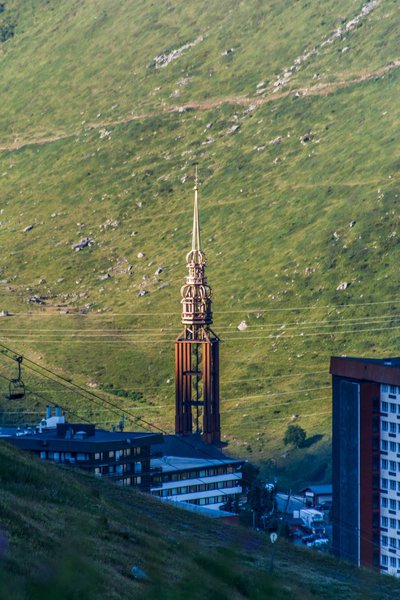
Le clocher des Menuires - CCCT  Architecture
ArchitectureLes Menuires Bell Tower
To celebrate the turn of the new millennium, Les Menuires had this bell tower built, which has now become a landmark of the resort. The architect Yves de Preval designed a beautifully elegant and dainty structure, and architect Jacques Facy ensured it was set within its surroundings in the best possible position to be visible from all angles. A year later, at the foot of this bell tower, a multipurpose hall was built for hosting concerts, meetings, shows and religious services, named “Espace Maurice Romanet”, in tribute to the man who served as vicar of Saint-Martin for 30 years.
In 2016, a fresco was painted by André Chaffardon across the whole back wall of the hall. The mountains are strongly interwoven into this wall painting which depicts themes of great relevance to the Belleville valley: the mountain itself, Le Cochet, Péclet, lifestock rearing in the pastures, Notre Dame de la Vie, or the mountain pasture hamlet of Les Bruyères.
 History
HistoryThe resort of Les Menuires
Up until 1965, life in Saint-Martin-de-Belleville was still guided by traditions of the past. Isolated at the bottom of a valley, the population's only resource was rearing livestock and barely had enough to get by. To save the valley, Nicolas Jay, Mayor of Saint-Martin-de-Belleville, had the idea of launching a study into the development of his village for tourism purposes and put forward a development plan. In 1964, work began on equipping the Les Menuires resort with its first facilities for skiers and its first residences opened in 1967. Alongside the steady development of the skiing area around Les Menuires, building work began in 1973 on a new resort at an altitude of 2,300m: Val Thorens.
After a period of considerable expansion through the 1980s, Saint-Martin-de-Belleville outlined a new, more limited development plan for the valley, broadly factoring in protection of the environment. In addition to the completion of the Les Menuires and Val Thorens resorts, this plan included the creation of a small tourist destination in Saint-Martin-de-Belleville, a picturesque village resort. The three resorts are connected to the wider 3 Vallées ski area.
The development plan is now complete: the village, which had lost two-thirds of its population in the 1950s, now has 3,574 permanent residents and some 55,000 tourist beds.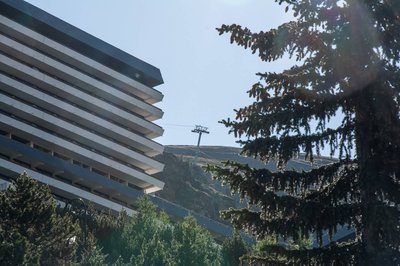
L'immeuble le Brelin - Vincent_LOTTENBERG  Architecture
Architecture"Le Brelin" apartment block
Clearly visible from the cycle route, the 'Le Brelin" apartment block overlooking the neighbourhood of La Croisette was built in 1972 according to the designs of architects Douillet & Maneval. Its elegant, clean lines give it an air of a vessel anchored on the slope, like a "passenger liner in the snow". The monumental building (640 co-owners) fits seamlessly into the cutting-edge neighbourhood and the façades have been designed with particular care, incorporating the original use of slate from the valley. This unprecedented architectural achievement earned recognition under the "remarkable 20th century Heritage" label, awarded by the Ministry of Culture in 2010. Launched in 1999, this label is aimed at identifying and showcasing urban complexes and buildings, which may or may not be protected Historical Monuments or protected spaces, whose architectural and urban interest justifies passing it down to future generations as features of 20th century heritage in their own right.
 Know-how
Know-howE-bike rental shop: Skiset Léo Lacroix la Croisette
Skiset Léo Lacroix la Croisette
Résidence Lac du Lou
73440 Les Ménuires
Secteur : La Croisette
+33 (0)4 79 00 28 15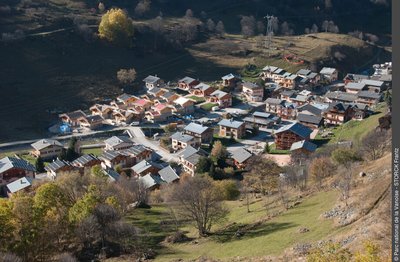
Le hameau du Bettaix - Frantz STORCK  History
HistoryBettaix hamlet
The name of the hamlet can also be written "Le Bettex". It would designate a wet, damp place (pronounced "blè" in Savoyard patois). The hamlet is built near the Doron des Belleville, but it is not the only one. The hamlet of Villarenger (1100 m) is even closer to the river and to the river Les Encombres, which has been destroyed by floods several times over the centuries. The Bettaix chapel is dedicated to Our Lady of Compassion.
Like all the other hamlets, the Bettaix has a bread oven. It was in this hamlet that Blessed Paul accepted the care of a family in the 18th century before beginning his ascent to Lake Lou and his pilgrimage route to Rome across the Alps. Le Bettaix is also the hamlet of the coal mines which supplied the families of the valley. Under the Teurre (a rock that dominates the Doron des Belleville), coal seams were once exploited, as well as on the site of Les Menuires, originally called "Mineria".
